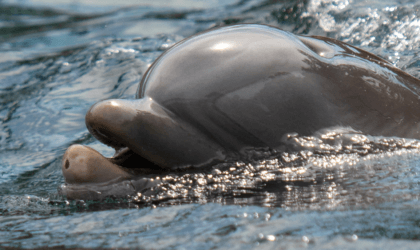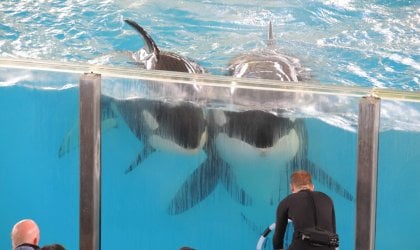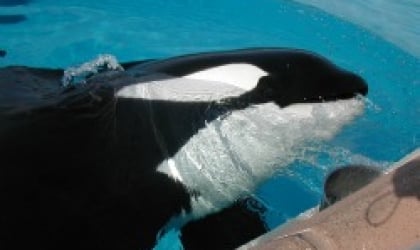PETA’s “I, Orca” experience has been a fixture near all three SeaWorld locations this summer. Cutting-edge virtual reality goggles allow tourists and locals to immerse themselves in a world in which they can swim in the open ocean with their orca family—and hear the haunting cries of an orca imprisoned in SeaWorld‘s barren concrete tanks.
SeaWorld first reacted by sending spies to harass us—then paid demonstrators to stand with signs denouncing us—but those tactics just made the company’s leaders look like schmucks.
There has been tremendous interest in the experience, but we thought you might like to hear about the reactions of some people wearing SeaWorld clothing and/or claiming to be SeaWorld trainers. It’s not pretty:
- One young woman ran up and grabbed the goggles, looked into them, and said, “I hit a boat. Oh, look, an oil spill. My echolocation is off. Oh, I hit a rock.” Even if she hadn’t been wearing a “SeaWorld Adventure Camp” T-shirt, we would have recognized that hyping these threats to orcas in the wild is the same pathetic strategy that SeaWorld uses to try to justify not releasing the animals it holds captive to a coastal sanctuary. This woman apparently failed to realize that the families of some of the orcas at SeaWorld are thriving in the same supposedly threatening ocean, their rightful and natural habitat. When we gave a leaflet to another young woman who was with her, she ripped it in half.
- A man wearing a “SeaWorld Adventure Camp” backpack and a SeaWorld lanyard stopped to tell us that he had been working at SeaWorld for five years and insisted that the orcas don’t live in tanks but rather in “big pools.” When we told him that wild orcas swim up to 100 miles a day with their families, he seemed not to know or believe that, saying, “That’s not true—no animal in its right mind would swim 100 miles a day.” He grew increasingly hostile and stormed off, giving us the finger and telling us to “f*** off and eat d***.”
- A young woman wearing another SeaWorld lanyard approached the table and identified herself as an orca trainer. She said that the orcas aren’t medicated and that there may have been problems in the 1980s and ’90s but that “they don’t do that anymore.” We told her that the orcas’ medical records show that they are, in fact, still medicated.
- A group of three people approached the table, including a woman who also identified herself as a SeaWorld trainer. She asked, “How do you know orcas have emotion?”—and dismissed the traumatic transfers of orcas between parks as akin to “going to college.” Another in the group claimed that moving the animals to a sanctuary would give them “false hope.”
But those people aside, everyone who took a turn with our virtual reality experience was both intrigued and moved by “I, Orca.” One woman broke down in tears. Two young girls compared the experience to being grounded for the rest of their lives. One staunch supporter of SeaWorld changed his mind after “I, Orca,” vowing never to go back. A mother had a change of heart and asked her two sons, “OK, so are you guys cool with not going to SeaWorld today?” Both kids agreed that they didn’t want to go. Others signed our petition, and one woman told us that she’d be demanding her money back.
What You Can Do
Join the call for SeaWorld to send all the orcas it still confines to seaside sanctuaries today.




